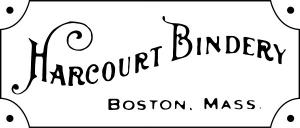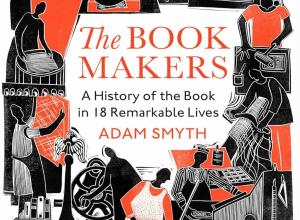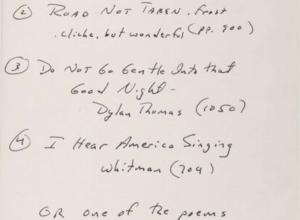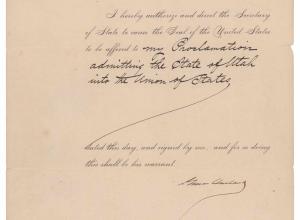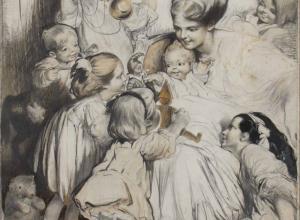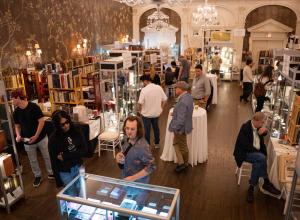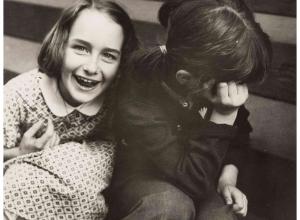Bright Young Booksellers: Alexander Akin
Our Bright Young Booksellers series continues today with Alexander Akin of Bolerium Books in San Francisco:
 How did you get started in rare books?
How did you get started in rare books?
My mom has a yellowed newspaper clipping that shows me in a baby carrier on her back as she and my dad peruse books at the UC Riverside library book sale. I guess my parents got me hooked early. My dad was a steelworker, and my mom a union organizer, and as a kid I thought every working-class family had a huge library at home. I remember my first purchase of a rare (though not expensive) book when I was ten, when I found a hardcover tract published by missionaries in China about a hundred years ago, using a phonetic transcription to represent the local dialect of a coastal town. I paid something like four weeks' allowance for it, and still have it. The first item I ever got signed was a campaign brochure from when Angela Davis was running for vice president. (It wasn't exactly a huge coup to get her autograph, since my mom worked with her). Through high school and college I worked summers for a coin dealer who specialized in medieval Islamic and Indian coins, and I collected books relevant to these fields for a working library. While collecting books, though, I never thought of selling them until I was in graduate school, when I started scouting for the (late, lamented) firm of McIntyre and Moore in Cambridge, MA. I kept finding books I didn't need for myself, but that I recognized as worthwhile, and it occurred to me that I could try selling them or trading them for store credit. I was working on a dissertation in late imperial Chinese cartography, and I traded stacks of unrelated tomes from nearby thrift shops, estate sales, and even piles of academic books left on the sidewalk before recycling pickup, in exchange for many a title in Chinese history from M&M. I then started selling on Amazon to keep a larger proportion of the proceeds. We moved to San Francisco to follow a job opportunity for my wife, while I was in the writing-up stage of my dissertation and taking care of my daughter during the day. I carried her around in a Baby Bjorn while visiting various bookstores to keep from going stir-crazy. One day I walked into Bolerium and I realized I had found paradise on earth.
What is your role at Bolerium?
It started from the fact that I was spending more money there than my dissertation completion grant could really allow. I started bugging John Durham about doing some sort of work at the shop for store credit. Eventually, he set me loose on the towering piles of boxes in storage, sorting stuff out by category, completing runs of serials, etc, while I set aside things that I wanted for myself in payment. One day I found a box of Chinese-language gay travel guides to Taiwan, going back to the first one that was published. He had no idea how they had found their way into Bolerium's storage. (There were - and still are - boxes on our second floor that haven't been touched in 20 years). Mike Pincus, his business partner at the time, picked up the phone and sold the lot to an east coast library in a flash. That might have been the incident that led John to take me more seriously as a potential asset to the shop. My dissertation completion grant had concluded and I was eligible to work for pay, so he hired me as a packer (which was great training for what sells and to whom), working on cataloging after the shipping was done for the day. I had finished my dissertation, however, and with a PhD from Harvard I went on the job market, fully expecting to become a professor of Chinese history. I found a short-term position in Boston as the Smith Fellow at Roxbury Latin School (a wonderful experience), while also filling in at Brandeis in the afternoons for a faculty member who was on leave for the year. The fiscal crisis at that time (2010) had really decimated the market for my field of late imperial Chinese history. Budgets were slashed and many university jobs that had been advertised were quietly canceled. Worst of all, in many cases teaching at colleges on an adjunct basis actually paid less than Bolerium. Since my wife had found a lucrative niche in San Francisco, I realized that it didn't make sense for me to drag the family around the country scrambling from post to post until I found something with tenure. I came back to Bolerium, this time for good, and after a couple of years we incorporated. I became the junior partner, with John the majority owner. I've expanded the shop's specialties to include more Asian and Asian-American material, and I also buy and catalog stock related to radical politics, Judaica and African American history. When we do book fairs I usually travel with John, though in some cases I represent the shop alone, such as at last year's Boston ABAA show.
What do you love about the book trade?
As an historian I love discovering new things. You can have all the Hemingway first editions you want; I'll take the trove of mimeographed newsletters published in the 1940s by underground activists in Chinatown. Our trade is quite diverse, with room for all sorts of specialties and variant approaches. At an ABAA fair I can see things that I fantasize about collecting if I won the lottery, like illuminated French manuscripts from the 15th century. The stuff I really like to handle, though, is what I envision as the raw material for researchers working on relatively understudied fields. Our shop has been cited in the acknowledgements of many books on political history and LGBT studies, and I tremendously enjoy finding librarians who "click" with us and helping them to build their research collections. Some time back we sold a book about a gay religious utopian commune near San Diego, a work of truly awe-inspiring strangeness, to a famous theological seminary - and last year out of the blue we received a letter from a grad student thanking us for having sourced that work, which became a centerpiece of his research. This job combines my academic background with the romance of the treasure hunt, offering endless opportunities for sleuthing.
Describe a typical day for you:
Get up at 6:30 to get the kids ready for school. By the time I head for the shop, sometimes stopping at one of our storage units to pick up or drop off material, most of the orders that came in overnight have been processed by our hardworking early birds, but I may pitch in to find items in foreign languages or to search for recalcitrant titles that nobody else has been able to put their finger on yet (a frequent problem in a large shop where some stock was cataloged years ago). I have stacks of papers, pamphlets and books arrayed around my workspace that crave cataloging, but the amount of this work that gets done depends on all sorts of other factors. Calls come in all the time from people trying to unburden themselves of books or ephemera, and sometimes it's worth throwing out the day's plans to make an emergency trip to someone's garage in the East Bay in pursuit of some trove or other. One respect in which we differ from most shops is that our specialties in radical politics and LGBT history bring us lots of leads from retired activists or their heirs. I like doing these book calls with my partner John, because we have different priorities and different ideas of what things are worth to us, and it can be valuable to bounce these ideas back and forth. The leads often come to us because of John's own activism in various groups going back to the 1970s. In any case, whatever interruptions the day has brought to my cataloging, by the afternoon I head out to pick up the kids, and it's family time until they go to bed, after which I often work on cataloging stuff I've brought home with me, or I put together thematic pricelists. Sometimes I can get more cataloging done in a couple of uninterrupted hours at night than I can all day in the shop.
 Favorite rare book (or ephemera) that you've handled?
Favorite rare book (or ephemera) that you've handled?
The most amazing thing in the past year was a handwritten prompt book for a "paper son," someone immigrating from China to the US in the 1930s under a false identity. A racist law from 1882 had banned general Chinese immigration, but there was a loophole if you were the child of a previously naturalized citizen who had gone back to China and married there. (Since Chinese women could not usually immigrate, and it was illegal in many places to marry someone of another ethnicity, going back to China was the easiest way to have a family - often the kids would live there for years before being brought over). In the 1906 San Francisco earthquake and fire, the local records burned up, which opened a window of opportunity because there was no easy way to verify claims about who had been born in the city. Thus a small industry of "paper sons" sprang up, in which people in China would pay for a false identity as the grown child of a Chinese-American citizen. Immigration officials (correctly) assumed that a significant proportion of such claims were false, so they interrogated would-be immigrants about the most minute details of their family connections, the arrangement of rooms in the house they lived in, what businesses were in their neighborhood in the ancestral village in China, and so on. People who claimed to be related would be interrogated in separate rooms to see if their answers corresponded. In order to prepare for these interviews, handwritten booklets would be produced that listed every conceivable question, paired with an answer for the "paper son" to memorize. The booklet we had included a sketch map of the neighborhood around the alleged clan compound. It is very unusual for these prompt books to survive, because of course discovery would mean serious trouble, including expulsion from the US. The example we handled is now in the collections of the Chinese Historical Society here in San Francisco.
What do you personally collect?
Books on Asian and Islamic numismatics, Chinese propaganda publications intended for foreign audiences, ephemera related to the World Festival of Youth and Students, lots of other series that have personal or academic significance for me. The one arena where I spend serious money is my collection of pro-Khmer Rouge propaganda. When I was in grad school I encountered a book in the library stacks that had been published by a sectarian communist group based in Chicago that had a friendship visit to Cambodia, during which they met Pol Pot and other senior leaders, toured communal farms, and so on. The book was lavishly illustrated with photographs of cheerful peasants in labor camps, children smiling with guns, and so on. Given what was known even then about the Killing Fields and mass starvation, the naiveté of these American visitors seems astonishing. For some radical political groups that are committed to excavating hidden injustices in their own countries, there is a desire to perceive a more just society in some foreign utopia. To see this in Cambodia under Pol Pot struck me as just about the furthest one could push this "grass is greener" complex. I have known a number of Cambodian immigrants who grew up in this period, all of whom have physical scars as well as emotional ones, and somehow it became a passion of mine to seek out everything I could that was published by foreign enablers, endorsers, or supporters of the Khmer Rouge. China was of course their main diplomatic sponsor, and as I can read Chinese I search for relevant material on the Chinese market, including children's comic books from the 1970s that feature Khmer Rouge guerrillas as heroes, doing things like throwing grenades into boatloads of Lon Nol government soldiers. I have material from all over the world, and my plan is to write a book about this phenomenon - but I still find material that surprises me and adds new dimensions to the picture, so I'm not yet ready.
What do you like to do outside of work?
I have two kids, 3 and 10, and I spend a lot of time with them. That's an advantage to this business, the freedom of scheduling, especially for a shop like ours that has several employees. I used to be a big hiker, going on multi-day treks, but it's harder with kids of this age. I still have some tenuous connections to the coin business and I sometimes travel to do translation at auctions of Chinese coins; last year I went to a show in Hong Kong to represent the firm I used to work for. I still do research in the field of Chinese historical cartography, presenting papers at conferences of the Association for Asian Studies and the American Association of Geographers, and publishing articles. I also spend more time than I should on Facebook, to be honest!
Thoughts on the present and future state of the rare book trade?
Every urban bookstore faces the problem of rising rent, unless the proprietor is also the landlord, and I see many cities becoming culturally desertified. A few years back I went to an academic conference in San Diego and I printed out a list someone had posted online a year or two previously, naming his ten favorite best bookstores downtown. After finishing my other business, I started tracking them down, and found that every single shop on this particular list had closed - one of them just a week earlier. Of course the books are still out there, but the market is atomized, with countless individuals dealing online from their basements or garages, and many collectors, even serious collectors, have little to do with ABAA-level shops. One thing I've been happy to see in my area is that even as some shops have been driven out of San Francisco by rising rent and the sterilization of the city's cultural legacy, relatively young people are opening shops across the bay in places like Oakland. When I read the laments of long-time booksellers about what the internet has done to business, I feel glad that I only came onto the scene long after the process was already underway. This allows me to focus on the opportunities this brings (like selling to buyers all over the world, or being able to scout online for under-described or unappreciated items), rather than the way of life it has undermined. The greatest fear I have, for a business like ours with its orientation to libraries, is the seemingly ever-increasing turn to digital repositories. Many younger librarians seem to be under the impression that everything they need is already digitized somewhere, and their focus is on purchasing access rights rather than seeking out physical material that is unknown (but would cost money to process and store).
Any upcoming fairs or catalogues?
Having recently finished the ABAA fair in Oakland, our next out-of-shop experience will be at RBMS in Iowa City this summer. I'm also putting together a catalog of political handbills, from the Knights of Labor to Black Lives Matter.
[Images provided by Alexander Akin]





